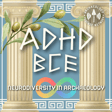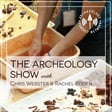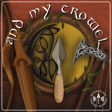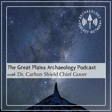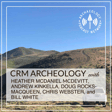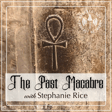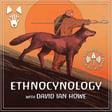Become a Creator today!Start creating today - Share your story with the world!
Start for free
00:00:00
00:00:01

Searching for evidence of neurodiversity through museum displays with Kyle Jordan (Part Two) - Ep 06
In the second half of this episode George is again joined by Kyle Jordan, a Museum curator and Egyptologist born with Cerebral Palsy.
They talk about his museum displays, disability in antiquity and how raising awareness of differences in the past helps to give a more realistic and wholesome perspective of the human story. As with physical differences, Neurodiversity has been an integral part of the journey so far!
Transcripts
- For rough transcripts of this episode, go to: https://www.archpodnet.com/adhdbce/06
Music
Your Story by MusicbyAden | https://soundcloud.com/musicbyaden
Music promoted by https://www.chosic.com/free-music/all/
Creative Commons CC BY-SA 3.0
https://creativecommons.org/licenses/by-sa/3.0/
ArchPodNet
- APN Website: https://www.archpodnet.com
- APN on Facebook: https://www.facebook.com/archpodnet
- APN on Twitter: https://www.twitter.com/archpodnet
- APN on Instagram: https://www.instagram.com/archpodnet
- Tee Public Store: https://www.teepublic.com/stores/archaeology-podcast-network?ref_id=5724
Affiliates
Transcript
Introduction to the Episode
00:00:01
Speaker
You're listening to the Archaeology Podcast Network.
00:00:17
Speaker
Hello
Exploring Neurodiversity in History
00:00:18
Speaker
and welcome to ADHD BC Episode 6. So there thanks for that, Kyle. I think now we'd like to talk a little bit about, obviously we're looking for neurodiversity or neurodivergence in the past and we're looking for examples. Normally we go to archaeological sites or quotes or whatever, but right now. I'd love just to talk about some of your displays and perhaps if we could look, just follow on a little bit from what was mentioned in the previous section about, you obviously mentioned Aristotle's idea of exposing kids, which is but a very nice way of saying, let the poor things pass, which is just horrendous. And I feel quite disappointed actually. I've got quite a soft spot for Greek philosophy, especially sort of Socrates and Aristotle and Plato, but I'm not going to have to rethink that now. with
Museum Curatorial Work on Disability
00:01:08
Speaker
this episode, if we could look at maybe some of your displays and talk about examples of obviously disability, and if you can see neurodiversity or neurodivergence, and talk a little bit more broadly about this universal nature, because we always talk about the the negatives a lot, about humans, about pollution and war and all that, love but actually, we've got great capacity for empathy and compassion and care,
00:01:35
Speaker
Yeah, no absolutely. My displays that I've had the privilege of putting together so far. So as you mentioned in the introduction, I was previously the creating for change fellow at the Ashmolean Museum and Pitt Rivers Museum in Oxford now creating for change.
00:01:51
Speaker
was a fellowship designed to give disabled, deaf and neurodivergent people the chance to work as curators in museums. And in that work, we looked at their museum collections with the partner museums to see if we could kind of highlight stories of disability. Now, in my role at the Ashmolean Museum and Pitt Rivers Museum, obviously I'm coming from my own archaeological background and archaeological knowledge and my kind of knowledge on looking at disability and antiquity. So I knew that the first challenge would be kind of looking at this material and really saying, well, where are the disability-focused stories? Now, on the Ashmolean Museum side, I had the benefit there because a lot of the material I'd worked with there, particularly the Predynastic,
00:02:31
Speaker
figurines and artworks from what's known as the higher accomplice main deposit but was the subject of my master's thesis. Therefore, I was able to work with that quite ah easily. I already
Co-Producing Exhibits with Neurodivergent Individuals
00:02:41
Speaker
knew what I was going to say there, particularly as again, artworks tend to obviously give us a view of the body and that body can show differences. But bringing it to neurodiversity and where I think you know our approaches to this in archaeology and in wider society will only be benefited from when we start to include those with the lived experience of neurodiversity to really bring that perspective is when I was doing my work at the Pitt Rivers Museum, for any who haven't had the privilege and the joy of visiting the Pitt Rivers Museum yet,
00:03:12
Speaker
It is a what we call a typological museum. That means that instead of the collections being categorized by, oh, we have Africa here and Asia here, or we have ancient Egypt here and ancient Rome over there, you instead have all of these different objects organized by a type.
00:03:32
Speaker
ah So in one case, you might have an entire dedication towards the human form and art or towards medication. And they can come from all
Themes in Museum Displays
00:03:42
Speaker
over the world and they are just arranged together in almost a kind of little smorgasbord kind of way, almost akin to what early museums were known to be as cabinets of curiosities.
00:03:54
Speaker
It's a bit more contemporary than that now, but it still captures that same aesthetic ah in some ways. And what that meant was at first quite a challenge, because then you're thinking, well, how do I intervene into something like this to really say ah disability stories? Except but one of my ah good kind of peers from the University of Sydney, Lauren Poole once said in a talk that she gave that any object can be a disability object if you look at it through the right lens. Because we all bring our own unique lenses to our work, that's inherent in what we do. To say that there is any true objectivity when looking at an object or a person or a ah part of history is objectively false, iron ironically enough. like We are all subjective creatures and that subjectivity is what's good because it allows us to approach things with a more multivocal voice.
00:04:40
Speaker
So as part of the work that I did, we focused on a bit of co-production with local disabled people from around the Oxford area. And within that group, I wanted to ensure that we could have as decent a spread as we could have various different embodiments of disability, and that included many different people who were neurodivergent in one way or another. So when it came to looking at the space and thinking about the themes that we wanted to talk on, we focused on three distinct themes. We looked at form and function, so how the body and mind had been perceived over time and how that is represented in the objects that are on display.
00:05:14
Speaker
We fought but about precarity and violence, thinking about why is it that people are made disabled by violence, but also how disabled people are then put into precarious situations. But fundamentally, what happens to the person who's put in that situation, because we didn't just want to focus on the victim in the moment, we wanted to think about them as a person after the fact, because of course, any victim is still very much a person after the fact and has that journey afterwards. but And then lastly, but most importantly, we also wanted to emphasize care.
00:05:44
Speaker
because we wanted to bring back to, as you were just saying, this universal idea of care that has existed in human cultures and how that is expressed in the collections and how disabled people bring a unique perspective on care. And so just to highlight one or two examples quickly of where Newer Divergence kind of helped to really redress some of these objects and really look at them in a different light.
00:06:07
Speaker
For example, we had one co-producer who has
Personal Connections with Historical Artifacts
00:06:12
Speaker
what is commonly still known as Asperger's syndrome. There is a ah move away from that term, but he chose to still describe himself as Asperger's syndrome because that was the term that he was given when he was a young lad. He's now in his 50s, and he recognizes why there's a move away from that because, of course, Hans Asperger's ah was complicit with the Nazis. but you know, he he still goes by that label. And so it's what, you know, forms part of his identity. Anyway, he also has experienced a complex PTSD. And so in the combination of those things, he really wanted to express ah how he's come to kind of reconcile with those things and make sense of them based on his own traumas and experiences. And so he made a connection
00:06:58
Speaker
with an ancient Egyptian heart scarab. An ancient Egyptian heart scarab but was used by the deceased to function as their heart to be weighed against the feather of truth to see if they were worthy of living in the next life in the life beyond. And he connected with that because we in the process of co-production had a really lovely conversation as a group about that and about because he wasn't the only one who was part of the group who had those experience of complex PTSD. And I relayed to them the story of the discourse between a man and his bar.
00:07:27
Speaker
And this is a story written in what is known as the Middle Kingdom period, so around the kind of second millennium BCE, going into the beginning of the the first millennium BCE. And this is really taught or actually thinking thinking that way. Yes, second millennium BCE to the first millennium BCE. This is a story where a man is having a discourse with himself, with his bar or sometimes his heart, because in the Egyptian kind of view of their own body minds, the heart was the center of the mind.
00:07:56
Speaker
He's basically having a discussion with his own heart about the meaning of pain and suffering and asking what the point of life is because he's living in a time of constant change and flux and uncertainty and he's just not sure. It's not so much suicidal ideation as it is just kind of coming to terms with why he's experiencing all the things that he's experiencing and what the point of it all is.
00:08:18
Speaker
And this co-producer just really connected with that and said, well, that's exactly how I feel when I'm thinking about my neurodivergence and my complex PTSD. Is this all in my mind or is this something that is part of life? Is this part of the everyday sense things and how he feels that both physically, you know, all these different kind of pressure points in his body when he's having an anxiety attack? And also then when
Neurodivergence in Ancient Perspectives
00:08:41
Speaker
he dreams and he dreams of these scenarios that are difficult for him and cause him to kind of have that anxious moment, that those aren't just inherent to his mind, but those are something that he feels. And there was a very raw kind of story to share in the museum context, because often we're used to the idea of the museum label being this very objective thing against this idea of objectivity, how subjective that is. But
00:09:05
Speaker
it really resonated with our audiences. People stopped and they really thought and they said, wow, I would never really think about that with this object, you know, because the heart scarab doesn't just encapsulate that kind of function that it had as a kind of item as an offering. But but also kind of encapsulates these deeper feelings that, A, the ancient Egyptians were having about the meaning of their heart and that all the things that it held, their personal thoughts and feelings, and then bringing that into the contemporary, how we deal with our personal thoughts and feelings.
00:09:36
Speaker
I just want to go back really quickly to that ancient Egyptian poem you mentioned. well one One thing I always like to think about with this, when we talk about all the Egyptians believed that the heart was the centre of the mind, well, they didn't do it like that by chopping open bodies and piecing it all together. It was a lived experience. It was how, if you feel you feel emotional, maybe you know you'll just say but that that push and pull between your heart and your mind that with with within in ancient Egypt, they rightly or wrongly
00:10:09
Speaker
put more emphasis on the heart. And I love the fact that the guy helping you out on your display was inspired to think about and the your life and death and why he's here. and And for me, that really shows a, not necessarily a newer divergent trait, but it shows a busy, intelligent mind, doesn't it?
00:10:35
Speaker
Absolutely. I mean, it's one of these things where, you know, human beings as species, we are a very reflective creature. We're very introspective at times as well. We can't help but stop and wonder at the wider questions as the things that we can't really grasp and explain just by sense and touch alone. We kind of have to sit there and reflect and that can be overbearing at times, but it can equally at times be inspiring.
00:11:00
Speaker
and enriching and the nature of the story of the discourse between a man and his bar. like in In the past, it's sometimes been been kind of inferred as a discourse on suicide, but again, that's not what it's about. It's a wider dialectical question about you know what it means to be human.
00:11:18
Speaker
and the meaning of pain and suffering in that equation and how we make sense of all that and how we make sense of it in the midst of an uncertain time and that's something that humans across history have had to deal with and the fact that you can go this far back and see it there is a reminder that we have always been dealing with it and that it's an open question to really reflect more and the fact that in the contemporary sense my co-producers could make a connection with it then with their own experiences of neurodivergence and complex PTSD is really vital and especially just to go back to what you were saying about how the ancient Egyptians kind of perceived the heart as the center of the mind
00:11:56
Speaker
They did this based on their own kind of embodied sense of that of themselves as well. It wasn't just ah purely a superstitious thing. like In their medical papyri, which were quite extensive, and we only have fragments today, but in what's known as papyrus ebers, which deals with all sorts of ailments, the way that Egyptians would write about medical conditions is they would kind of write a diagnosis or prognosis of them. And then they would write about their treatments and the ways in which they would be observed, yada, yada, yada. And they would keep these records for future doctors to refer back to to obviously think about their own treatments.
00:12:29
Speaker
When it comes to the heart, there is a book or a section rather of Papyrus Evers that sometimes singled out as being about the rhythms of the heart. And this can be inferred either as to talk about the cardiovascular system and what they knew of it based on embalming and based on treatments for people with, with infections and stuff like that. However, there are also in the text, talkings about the kind of various temperaments of the heart. And when I say temperaments, what I mean is how it felt. when they were having what we might call a panic attack. What they might have felt when they were experiencing a flush of excitement or a kind of sort of buzz but and those sorts of things. So there is a very clear understanding and attunement, even if not exactly in the ways that we would think today about how our kind of mental wellbeing affects
00:13:23
Speaker
our physical well-being and the connections between the two and that's why they may have had this idea of the heart as being its own living thing with the soul inside. Because there are even stories which refer to, oh my heart caused me to flee or my heart caused me to go into a flight.
00:13:40
Speaker
So, this I body minds, as we would call it today, I believe the term was coined by Dr. Sami Shalk. We're talking about the idea of the body and mind, not a separate things as separate conditions, but something that are intertwined. It may not have been coined by Dr. Sami Shalk, but it's where I first encountered it. Here, Dr. Sami Shalk is a prominent disability activist and scholar in the United States, wrote Black Disability Politics, the book. Anyway,
00:14:06
Speaker
My point is is that this is something that is inherent to the human condition, that there are feelings and thoughts and and attitudes that have been dealt with for a very long time. And even if we can't necessarily pinpoint exact instances of neurodivergence by allowing that lived experience to come through in our analysis, to allow that subjectivity to look at the historical record and say, well, here's something that I can relate to. Here's something that I can really see my kind of worldview come into play through my embodied experience in neurodivergence gives us the possibility of, while we can't say of any certainty that that was necessarily a neurodivergent trait, as you were saying, it does allow us to see how neurodivergence has its role to play in the wider development of people's perceptions of the world. And this comes into various things like society and the development of power structures, but also in ritual
00:15:01
Speaker
As well, if I can, just very quickly, I want to touch upon how in my current display, another one of my co-producers, who's also known a virgin, the display I've been working on to just to give some context is for looking at disability health and disability in the Roman world at the Verilamian Museum. but They looked at temple rituals.
00:15:21
Speaker
and how they as a neurodivergent person live by rituals. They do that every single day. Having a repeated action is a way to give them themselves some structure and rhythm that keeps them calm and keeps them happy. And so when they were thinking about temple rituals in the Roman world, which are obviously a big part of people's daily life, and if you think about even household gods and the rituals that would go around those, those are very important rituals. And so would someone who is neurodivergent or autistic and really function on the basis of rituals really have stood out in the Roman world or would they have been right at home? That's the that's the fun question that they're posing in their labels. I love that. Just to consider those possibilities all of a sudden gets you to realise, yeah, that kind of makes sense. Yeah, absolutely. I was going to have one last quick break and then we'll come back to talk some more about this.
00:16:12
Speaker
Okay, Carl, so we've probably got about 10 minutes. So if if if we can do one thing, I just look because I know you're you're a chat bag like me, you're just going to keep talking. So we we're going to go off in all sorts of directions. So just to add a little bit of structure, if we can just talk a little bit about and because something I'm desperate to talk with you about is and identifying neurodiversity or neurodivergent traits in the past.
00:16:39
Speaker
There's tons we could talk about
Inclusion of Neurodivergent Perspectives in Archaeology
00:16:40
Speaker
outside of that, but if we could aim to sort of sail the ship down that channel. no Absolutely. I think, like like I was hopefully illustrating with those examples that I gave of the my co-producers' work on the displays I've done, I don't think we could ever really get anywhere near close to beginning to think about neurodivergence in the past without including neurodivergent people and writing and theories in that work. And this is where, you know, archaeology as a discipline more broadly really has to kind of
00:17:12
Speaker
bring in more from what is often referred to as disability studies or critical disability studies to start to think about how those body minds really start to influence not just human behaviour and thoughts and processes, but also just the human experience, that ontological experience, ontology being the experiences of the body and the mind.
00:17:31
Speaker
And I think when thinking about neurodivergent specifically and looking for it in the past, I think it could start by really taking a closer reading to a lot of those kind of bits of literature that some of which we've already talked about and thinking about where a neurodivergent reading of those sources could. It's not necessarily about saying whether the authors themselves or any particular person they're talking about was or wasn't neurodivergent but It's more about thinking about, well, how could the experience of new divergence have influenced, ah you know, kind of societal behavior or a person's behavior in this sort of way. So for example, I'm just going to spit ball here. How would a reading of Cicero
00:18:14
Speaker
change if we consider the possibility that he may have been a little bit nearer divergent. I'm not saying whether he could or couldn't have been. I don't think we'll ever, ever know. And that's not the point. The point is, how do we think differently if we consider the possibility that our authors, our interlocutors that we get engage with, weren't just that that standard neurotypical one body, one mind sort of person that we are kind of, again, as we were talking about earlier, engineered to assume that we all must be. yeah In reality, you know people in the past were just as diverse, just as different as we are.
00:18:51
Speaker
Yeah, absolutely. That's all I was going to say, actually, Carl. Yeah, I wanted to make that point. Yeah, yeah no, carry on. No, it's okay. And so, you know, I think by expanding the discipline, making it more inclusive and giving this opportunity for us to read the past, both literature, but also objects in a different way, again, it just brings a different way of appreciating how things may have been done. I mean, I spoke to a gentleman named Charlie Hales, who is a a classics teacher ah in the UK, who's also a neurodivergent. There's a great group, by the way, called Esterion, which is for neurodiversity in the classics, which you may have already heard of. Sadly, no. Yeah. Put that one in the ah show notes. we'll have to you know that Look them up, get in touch. I mean, they're a wonderful bunch and many neurodivergent classicists are there, but it's about like kind of reading those sources and thinking about them again in this different context. And that in particular, I would say, along with kind of literature that's written by scholars who are obviously commenting on their present at the time, so people like Cicero again, or Aristotle, as we mentioned earlier, or any of the philosophers,
00:19:57
Speaker
There's also thinking about kind of their narrative literature and what that might tell us, because the thing about things like myth and a legend and epics like that is they are very much a reflection on the human condition. yeah Obviously to exaggerated proportions, but they do feature elements of that. and so A lot of what is written about in terms of kind of the broader term of kind of the mind in and disability in the ancient past, obviously looks at a lot of these myths and thinks about what they could be saying about those in ah in ah in a kind of more subtextual way. So, for example, you think of stories like the Iliad and the Odyssey, which, you know, if we really boil them down and of course, they are a multitude of things. But if you really boil them down, the Iliad is a story about rage.
00:20:43
Speaker
and and and sorrow, and and the Odyssey is about the the almost the repercussions of that, the long journey home, which is both
Inclusive Perspectives in Historical Narratives
00:20:51
Speaker
literally Odysseus' is long journey, but also the journey that he is having to take as someone who has just endured a hell of a lot and continues to endure more. And those readings and those kind of reception studies, if you will,
00:21:04
Speaker
can really be enriched, I think, by considering a neurodivergent take on these things in much the same way as we can think about how, say, for example, the Greek god Phaestus, who of course has his physical embodiment of disability with his clubbed foot, but also his role ah as an inventor, as a creator, as a problem solver,
00:21:24
Speaker
It could also be a reflection of the ancients' ah recognition of people who have these physical embodiments, can also have these kind of very capable problem-solving capabilities. That's my personal take on why Hephaestus has his physical impairment because the ancients would have recognised that people with physical disabilities quite often had to come up with their own solutions, but that could also equally be true when considering how neurodivergent people quite often hu take on in their day-to-day and and therefore are also seen quite irregularly as as problem solvers, as managers, as multitaskers.
00:22:02
Speaker
So maybe that has something to do with it. And that also comes in. And this is, again, we're thinking about disability in an intersectional way, even further increases the possibility, like, you know, in those same stories, I mentioned the odd and odyssey, there is obviously the ah recurring the kind of female characters, the the witches and the powerful women who are, who are kind of somewhat kind of held tentatively at arm's length. Oh, I'm not sure about this one. How that could also be, you know, thinking about the experience of neurodivergent women and and how neurodivergences experience differently across gender lines and gender kind of norms and how that plays not only in the contemporary, but again, thinking about in the past, how, how women were perceived in the past and where neurodivergence might come in there. And therefore, if there was a sort of neurodivergent attunement with characters like Cersei, for example, or,
00:22:51
Speaker
Yeah, I could go on, but my point is, is again, it's not saying definitively, it's not about saying, oh, this person is neurodivergent, or this character is neurodivergent, it's about how a neurodivergent lens can give us a new reading of these things, and therefore might reflect ah ancient kind of recognition of these conditions in the in the past, if not by, obviously, how we categorize them today, that but then by how they are expressed and how they are felt.
00:23:17
Speaker
And then that again also helps us when thinking about it from from a non-fiction author's perspective, how those things may have influenced if not their decisions and their actions, but then maybe the sorts of people that they interacted with when they refer to characters who were seen as kind of quirky or or different.
00:23:35
Speaker
you know, it just, it just multiplies the possibilities and creates a more colorful picture, I think. And that's ultimately to the benefit of our understanding of the past and our understanding of ourselves, because that's where I would really like to conclude. It's just to say that the point of doing all of this is that it's not about saying, oh, this person is neurodivergent now, this person is disabled now, therefore, or their hours go away, normies. It's about saying that, it's about saying that life is much more multifaceted than just, oh, they they were they were a great warrior or great statesman or or a philosopher and and they lived and they died and this is what they said and that's the end of it. It's like, well, they
Disability as Central to Human History
00:24:15
Speaker
lived through a world that were
00:24:19
Speaker
in their time always changing, always developing as we do today. And their embodied experience of themselves would have played a role in in how they felt and how they feel. And it's recognizing that possibility that allows us to appreciate that it's for all those reasons that humanity has been able to get as far as it has by embracing that kind of broad range of differences, that broad range of opinions that helped to inform how we have chosen to live as a society And that it's only by continuing to accept that broad approach and those broad divergences that we will ever be able to make it any further. And that's the tension that I feel like underlies our present is that we are living in a world that is constrained by this idea of the way that things ought to be done. And unfortunately, not to get on my soapbox, but I think we are all starting to feel that the ways in which we've been told things ought to be done are not working.
00:25:08
Speaker
yeah um And so the only way to move forward is to but bring in newer ideas and different ways of ideas. And that can only be achieved by including the voices that have up to this point continually been suppressed. And that is, again, a broad church of different types of people that are intersected together. But in terms of disability, I think it's about showing that it is not about deficiency. It is not about the other. I really despise the phrase, the forgotten other. I realize why it gets used, but I hate it because forgotten by who and whose other.
00:25:36
Speaker
You know, i think I think actually when you think about it, disability has been at the very crux of what humanity is because it is a condition that you can either be born with or a condition that can be kind of brought about either by instant or by intention. yeah And by actually starting to understand that and how it affects us, we can begin to ask deeper questions of ourselves and understand that none of this, again, society at large, could have been possible without people like us.
00:26:04
Speaker
Absolutely. And that's where I want to end. Karl, that's absolutely fantastic. I think if I could just add to that, and they just yeah draw join on what you what what you've what you've been saying there. if you If we hark back to what we were talking about with the the great incarceration, and we're talking about prejudice, and we we're we're here, with yeah you see get on that soapbox and live on that soapbox, Karl. Don't apologize for doing that. That's fine.
00:26:27
Speaker
It needs to be done for those ah reasons, but for for the negative reasons, for fighting back reasons, essentially, for our own sanity, for our own peace of mind and our own sense of pride. But also what you get with it, you get a better perspective. I think we did we limit ourselves when we try to be neurotypical or we try to create these cultures that are monochronistic and they everybody born lives dies in the same way. it's not going to It doesn't
Concluding Remarks on Inclusive Narratives
00:26:53
Speaker
work. That's not who we are. The universe is chaos. Human beings are chaos. We're supposed to have the differences. We're supposed to be the way we are. And when we discover that, when we really look into it, when we find the colour, we find the richness, and we look at archaeology through those lenses, it's a different world. It's not it's not
00:27:16
Speaker
avatars, it's not neurotypical, it's not boring, it's incredible. And I think that's one of the great things that you do with your work, and your your displays especially, is highlight the differences that and until recently have been completely ignored.
00:27:33
Speaker
Well that's what I hope to do and that's what I'm going to keep doing I think and I want to kind of almost capture the imagination that way and just again remind people especially those who have been otherwise ignored or misunderstood in the contemporary present that this world has always been theirs and it always will be. We were there at the very beginning and we'll be there at the very end because fundamentally there's nothing more human than us. Perfect. Kyle, thank you so much for coming on and we are going to have to do this again.
00:28:02
Speaker
and Absolutely. Thank you so much for having me. No worries, Kyle. We'll see you soon. Thanks very much. it Take care. Bye. Bye bye.
00:28:21
Speaker
The Archaeology Podcast Network is 10 years old this year. Our executive producer is Ashley Airy, our social media coordinator is Matilda Seabrook, and our chief editor is Rachel Rodin. The Archaeology Podcast Network was co-founded by Chris Webster and Tristan Boyle in 2014 and is part of CulturoMedia and DigTech LLC. This has been a presentation of the Archaeology Podcast Network. Visit us on the web for show notes and other podcasts at ww www.com. Contact us at chrisatarchaeologypodcastnetwork.com.
